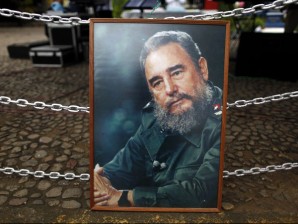
FIDEL CASTRO TURNS 85. A portrait of Cuba's leader Fidel Castro hangs from a string of chains during a birthday celebration marking his 85th birthday, in Managua, Nicaragua, Friday Aug. 12, 2011. Supporters of the ruling Sandinista party, Cuban nationals and admirers gathered in Managua's Cuba Square to honor the elder Castro on the eve of his August 13th birthday. AP
– Cuban revolutionary icon Fidel Castro turns 85 on Saturday amid celebrations in his honor that he so far failed to attend.
Cuba has been partying since Tuesday, with concerts, ballet performances and art exhibitions organized on behalf of the man who led the island nation for nearly 50 years before ill health led him to cede power to his brother Raul in 2006.
The celebrations culminated late Friday with a “Song of Loyalty” gala at the Karl Marx Theater, Cuba’s largest with a capacity of 5,000.
Most of the events have been organized by the Guayasamin Foundation, named for the Ecuadoran painter Oswaldo Guayasamin, a close friend of Castro. The organization is often involved in planning Castro’s birthday celebrations.
However, the guest of honor did not show up.
Castro’s public appearances are increasingly rare. The last came in April, at the ruling Communist Party’s annual congress, when Raul officially succeeded his older brother as party leader.
Since that time, Fidel has only been seen in video footage visiting ailing Venezuelan President Hugo Chavez – who is receiving chemotherapy treatment in Cuba.
“Raul is in charge now,” Michael Shifter, president of the Washington-based Inter-American Dialogue think tank, told Agence France-Presse.
“Fidel gave him the power to make decisions, but he also set limits, especially for reforms which are slowly moving forward, with great caution.”
Raul, who turned 80 in June with little fanfare, is trying to push through a series of reforms of Cuba’s centrally planned economy that would encourage small private businesses and slash the country’s massive bureaucracy.
“Fidel belongs in the history books,” Cuban dissident economist Oscar Espinosa told AFP.
“The party congress marked the consolidation of power for Raul, who is not a democrat but a pragmatist, and is trying to correct the errors and failures left behind by his brother. Cuba today is not the Cuba of 2006.”
Castro’s birthday comes as Latin America, which he hoped would adopt his revolution, has swung to the left, with a wave of progressive governments taking power from Argentina to Nicaragua.
Chavez, Castro’s political heir of sorts, could make an appearance at his birthday celebrations, which coincide with the Havana carnival.
Castro now spends his time writing books and “reflections” on international issues – he has so far published 361 such works – from his home in western Havana, which he shares with his wife Dalia Soto del Valle.
Born Aug. 13, 1926 to a prosperous Spanish immigrant landowner and a Cuban mother who had been his housekeeper, Castro was the hero of the island’s revolution which swept Fulgencio Batista from power in 1959.
A communist icon when the Cold War was at its height, the unrepentant anti-American and anti-imperialist leader is seen by supporters as a great revolutionary and by critics as a merciless dictator.
His enemies say the revolution will die with him, but Castro’s illness has allowed for a smooth transition of power.
When asked what will follow his eventual death, observers can only agree on one thing – “a historic funeral.”